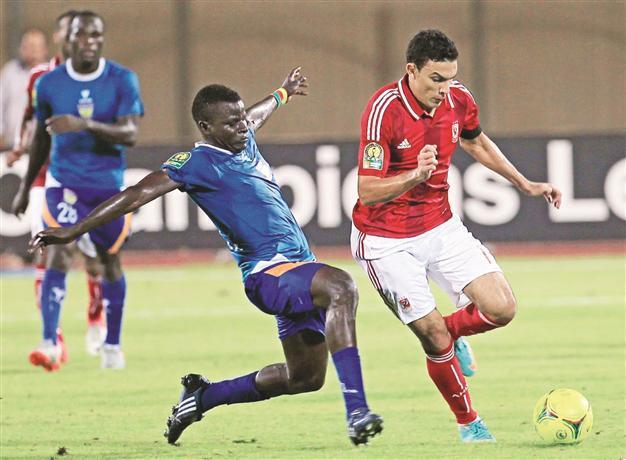Arab football’s giants ready for politically charged final
James M. DORSEY ISTANBUL - Hürriyet Daily News

Gedo (R) of Egypt’s Al-Ahly fights for the ball during a Champions League match. Esperance defender Mohamed Ben Mansour (inset) celebrates a goal.
This week’s African Champions League final between crowned Cairo club Al Ahly S.C. and Tunisian title defender Esperance Sportieve de Tunis is as much a battle of the titans as it is a struggle for the future of Egypt.
At stake in the first leg of the finals, the Nov. 4 match in the Mediterranean port city of Alexandria’s Borg El-Arab Stadium, is not only the African Champions League title but also a gamut of highly political issues, including the need for a reform of law enforcement; the role of police and security forces in ensuring security in stadiums; the relationship between the club, its players and its fans; the right of fans to attend matches; and the campaign to remove associates of ousted-Egyptian President Hosni Mubarak from football and eradicate corruption.
The match will be the first to be played by Al Ahly in front of its fans, which were banned from the few international and domestic matches their club had played since professional football in Egypt was suspended eight months ago after 74 people were killed in Port Said in a brawl. The aftermath of the brawl looms large with militant, highly politicized, street battle-hardened fan groups known as ultras opposing a resumption of professional football as long as those responsible for the incident are not held accountable and the supporters’ political demands are not been met.
Event-filled meeting The last time Esperance played in Cairo in April 2011, two months after the ousting of President Mubarak, militant supporters of Al Ahly rival Al Zamalek SC stormed the pitch in what amounted to a reclaiming of the stadium from the security forces, Egypt’s most hated institution because of their role in enforcing the Mubarak regime’s repression. The storming marked the beginning of a post-revolt campaign by the militants, Egypt’s second largest civic group that played a key role in the protests against the military and the law enforcement forces of the interior ministry and forced Mubarak to resign after 30 years in office. The campaign demanded the removal of Mubarak era officials and an end to corruption.
The militants, known as ultras, have booked a string of political victories in recent months in which they have attacked the offices of the Egyptian Football Association (EFA), Al Ahly’s training ground and the premises of media organizations. They have prevented a lifting of the ban on domestic football, the scene of years of often violent protests in the run-up to the demise of the Mubarak regime. Something ironically supported by their archenemy, the security forces that fear renewed clashes in the stadiums. A string of Mubarak-era officials have been forced to resign or withdraw their candidacies for office and the Illegal Gains Authority has banned the chairman of Al Ahly, Hassan Hamdi, from travel and frozen his assets on suspicion of corruption.
Demanding justice The militants are further demanding justice for their 74 dead colleagues before professional football matches are resumed. They are frustrated with the slow progress in legal proceedings against 74 people, including nine mid-level security officers, accused of involvement in the Port Said brawl that is widely believed to have been an attempt that got out of hand to punish the militants for their role in the popular revolt and to cut them down to size. The militants also want the security forces to be deprived of their responsibility for security in the stadiums and want to see the initiation of a process of reform of the police force.
A leading member of the Muslim Brotherhood, Essam El-Erian, publicly backed the militants this month, saying he agreed that premier league football should remain suspended as long as the group that brought President Mohammed Morsi to office is battling its political opponents. “The ultras were one of the most powerful forces to participate in last year’s revolution. The Premier League will only resume after the final whistle is blown on this political match, which I hope ends in a draw,” El-Erian said in a tweet. El-Erian referred to divisions over the drafting of a new constitution and the judiciary’s failure to hold officials responsible for the death of protesters during last year’s anti-Mubarak protests.
The interior ministry threw down the gauntlet last week when it announced that 15,000 Al Ahly fans would be allowed to attend the match against Esperance. The ministry’s decision came as players and fans held rival demonstrations for and against a lifting of the ban on football.
Players and fans clashed in early October in front of a Cairo hotel where Nigeria’s Sunshine Stars were staying in advance of a game against Al Ahly. The Al Ahly fans said they wanted to ensure the Nigerian team made it safely to the match. Four police officers and 13 Al Ahly fans were injured last week in a clash in front of a television station.
The ultras have said they would boycott the Champions League final in line with their opposition to a resumption of football. They have exempted international matches from their rejection of a lifting of the ban on domestic top-flight football. They have also agreed to the resumption in November of matches in Egypt’s lower leagues. Nevertheless, battle lines are being drawn.
